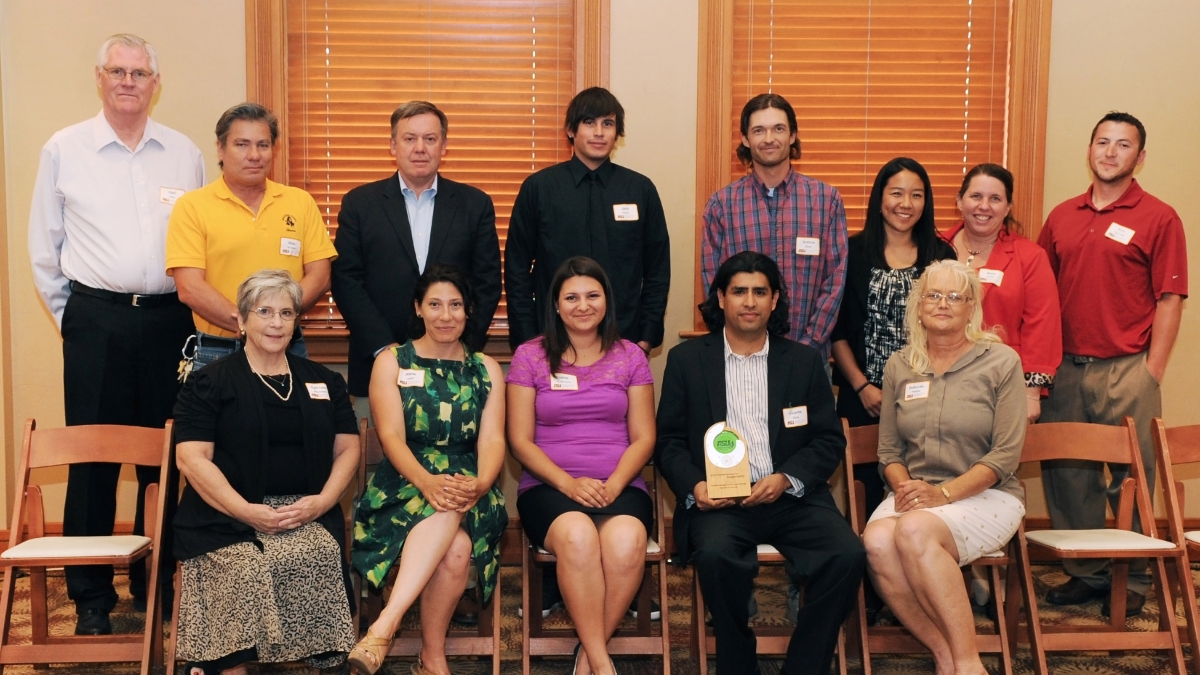2013 winners of President's Award for Sustainability

For their demonstrated excellence in fostering the successful development, implementation and promotion of sustainability, three programs at ASU were awarded the President's Award for Sustainability.
Sustainability is a balance of environmental, social and economic concerns. ASU staff and faculty are advancing sustainability by demonstrating exemplary practices, leading by example, and sharing solutions to catalyze change.
Facilities Management Grounds Services – Grounds for Grounds
In February 2012, Facilities Management Grounds Services in conjunction with Aramark, the Facilities Management Recycling Program, and the Biodesign Institute at Arizona State University introduced the “Grounds for Grounds” program to ASU. The program diverts Tempe campus’ used espresso and coffee grounds from the landfill and puts them to use as a natural fertilizer and soil amendment. It also helps the university economically and socially by efficiently using a waste product as a valuable resource while actively engaging participants in a sustainable future.
Presently the collection averages 500 pounds weekly, varying based on the time of year. This equates to a yearly savings of approximately $900 in tipping fees and up to $10,000 in fertilizer costs. The program is the first in food waste recycling on campus and another step forward in the University’s Zero Waste goal.
Team members:
Vicente Solis, Facilities Management Ground Services
Rigoberto Polanco, Facilities Management Ground Services
Jarin Castro, Facilities Management Ground Services
Joshua Ellner, Facilities Management Ground Services
Rob Kasprzak, Facilities Management Ground Services
Alana Levine, Facilities Management Ground Services
Lucas Mariacher, Facilities Management Ground Services
Mike Schantel, Facilities Management Ground Services
Deborah Thirkhill, Facilities Management, Ground Services
Harl Alley, The Biodesign Institute at Arizona State University
Kathleen Stinchfield, The Biodesign Institute at Arizona State University
Community partners:
Janet Castorena, Mesa Community College
Anna Krithis, Aramark
Katrina Shum, Aramark
Materials Management Recycling
Over the last few years, Materials Management (formerly ASU Stores and University Mail Services) has created a collection channel that is designed to promote and enhance the recycling efforts on campus. What started as a process designed to assist ASU Recycling turned into a business practice that created active engagement on the part of our team and the rest of the ASU community.
Materials Management picks up and recycles numerous items on a daily basis thus freeing up the ASU Recycling staff for other efforts. This program has grown over the years from toner cartridges and CDs to pens, pencils, VHS tapes, markers, and even rubber bands and it provides all of the ASU staff with the chance to easily recycle and actively engage in the ASU Sustainability Initiatives.
Team members:
Diana Gallese, Materials Management
Maureen King, Materials Management
Luis Barrandey, Materials Management
Michael Epting, Materials Management
Andrew Fassett, Materials Management
Alex Feierstein, Materials Management
Michael Joyce, Materials Management
Debra Kreuter, Materials Management
Lorne Lehr, Materials Management
Saraya Lyons, Materials Management
Steve Metzger, Materials Management
Adam Renner, Materials Management
Chuck Saffell, Materials Management
Andrew Sanchez, Materials Management
Jennifer Shiffer, Materials Management
Vince Shreckengast, Materials Management
Tyler Sumner, Materials Management
Corey Twilligear, Materials Management
Jeremy Twilligear, Materials Management
Todd Twilligear, Materials Management
Greg Williams, Materials Management
Sustainability Science for Sustainable Schools
The concept of sustainability is a “reframing” of the past debate of “either development or environment” into a challenge to scientists and citizens alike to reconcile just societal and economic aspirations with the environmental capacities of a delicate planet. Sustainable solutions are those that provide the best outcomes for people and natural environments, both now and into the future.
The Sustainability Science for Sustainable Schools (S4) program addresses the challenge of providing sustainable solutions through the teaming of ASU graduate students, researchers, and staff, high school teachers and students, and district administrators in a project designed to address the challenge of becoming a sustainable school within the Phoenix metropolitan region.
The program’s graduate fellows collaborate with teams of teachers and school leadership to address their sustainable school challenges across the scales of curriculum, campus and community. Broad S4 outreach meets growing community requests for learning about sustainability concepts from schools, private businesses, nonprofits, and community partners. S4 embodies the University’s vision of engaging internal and external communities towards solving sustainability problems and orienting teaching and learning towards sustainable solutions.
Team members:
Monica Elser, Global Institute of Sustainability
Omaya Ahmad, School of Sustainability
Lenay Dunn, University Office of Evaluation and Educational Effectiveness
Jen Fuller, School of Human Evolution and Social Change
Gina Hupton, Global Institute of Sustainability
Auriane Koster, School of Sustainability
Stefanie Leite, University Office of Evaluation and Educational Effectiveness
Lynette Pollari, Global Institute of Sustainability
Erin Redman, School of Sustainability
Charles Redman, School of Sustainability
Sandra Rodegher, School of Sustainability
Sherry Yazzie, Global Institute of Sustainability
Susan Ledlow, Valencia College